去甲肾上腺素

去甲肾上腺素结构式

|
常用名 | 去甲肾上腺素 | 英文名 | Norepinephrine |
|---|---|---|---|---|
| CAS号 | 51-41-2 | 分子量 | 169.178 | |
| 密度 | 1.4±0.1 g/cm3 | 沸点 | 442.6±40.0 °C at 760 mmHg | |
| 分子式 | C8H11NO3 | 熔点 | 220-230°C | |
| MSDS | 中文版 美版 | 闪点 | 221.5±27.3 °C | |
| 符号 |

GHS06 |
信号词 | Danger |
去甲肾上腺素用途Norepinephrine是作用于α-肾上腺素能受体 (alpha-adrenergic receptors) 的外周血管收缩剂。 |
||||
去甲肾上腺素作用早期研究证明精神分裂症患者缺少目标导向性的行为可能与他们皮质去甲肾上腺素系统的功能缺损有关。 去甲肾上腺素在学习和记忆中的作用也一直模糊不清并存在很大的争议。 一个为时甚久的假设认为肾上腺素神经系统介导情感事件中的加强记忆巩固部分。
研究人员用老鼠条件缺失去甲肾上腺素和肾上腺素的突变体以及把用拮抗物药和增效剂处理肾上腺素受体的大鼠和小鼠作为对照,在几个学习任务中检测了这个假设。 发现肾上腺素信号对修复中期前后关系和空间记忆是至关重要的,但对一般情感记忆的修复或巩固并不是必需的。去甲肾上腺素在修复中的作用需要通过海马中的β-肾上腺素受体发出信号。 这些结果证明记忆修复的机制能使记忆结束时间多样化并能与记忆获得或巩固的那些机理有所不同。 这些发现可能与几种精神病紊乱和用受体阻滞剂治疗心脏失败的症状有相关联系。 更多
|
| 中文名 | 去甲肾上腺素 |
|---|---|
| 英文名 | (R)-noradrenaline |
| 中文别名 | (R)-4-(2-氨基-1-羟基乙基)-1,2-苯二酚 |
| 英文别名 | 更多 |
| 描述 | Norepinephrine是作用于α-肾上腺素能受体 (alpha-adrenergic receptors) 的外周血管收缩剂。 |
|---|---|
| 相关类别 | |
| 靶点实验 |
Human Endogenous Metabolite |
| 参考文献 |
| 密度 | 1.4±0.1 g/cm3 |
|---|---|
| 沸点 | 442.6±40.0 °C at 760 mmHg |
| 熔点 | 220-230°C |
| 分子式 | C8H11NO3 |
| 分子量 | 169.178 |
| 闪点 | 221.5±27.3 °C |
| 精确质量 | 169.073898 |
| PSA | 86.71000 |
| LogP | -0.88 |
| InChIKey | SFLSHLFXELFNJZ-QMMMGPOBSA-N |
| SMILES | NCC(O)c1ccc(O)c(O)c1 |
| 外观性状 | 结晶 |
| 蒸汽压 | 0.0±1.1 mmHg at 25°C |
| 折射率 | 1.659 |
| 储存条件 | 充氩气密封于4℃避光保存。 |
| 稳定性 | Stable, but may be light-sensitive. Incompatible with acids, bases, oxidizing agents. Store at -20C. |
| 分子结构 | 1、 摩尔折射率:44.63 2、 摩尔体积(cm3/mol):121.0 3、 等张比容(90.2K):358.3 4、 表面张力(dyne/cm):76.7 5、 极化率(10-24cm3):17.69 |
| 计算化学 | 1.疏水参数计算参考值(XlogP):无 2.氢键供体数量:4 3.氢键受体数量:4 4.可旋转化学键数量:2 5.互变异构体数量:10 6.拓扑分子极性表面积86.7 7.重原子数量:12 8.表面电荷:0 9.复杂度:142 10.同位素原子数量:0 11.确定原子立构中心数量:1 12.不确定原子立构中心数量:0 13.确定化学键立构中心数量:0 14.不确定化学键立构中心数量:0 15.共价键单元数量:1 |
| 更多 | 1. 性状: 类白色至褐色细微结晶。对光和空气敏感。 2. 密度(g/mL,25/4℃): 未确定 3. 相对蒸汽密度(g/mL,空气=1):未确定 4. 熔点(ºC): 216.5~218℃(分解) 5. 沸点(ºC,常压):未确定 6. 沸点(ºC,5.2kPa):未确定 7. 折射率:未确定 8. 闪点(ºC):未确定 9. 比旋光度(º):[α]D25 -37.3°(C=5,1mol/L盐酸中) 10. 自燃点或引燃温度(ºC):未确定 11. 蒸气压(kPa,25ºC):未确定 12. 饱和蒸气压(kPa,60ºC):未确定 13. 燃烧热(KJ/mol):未确定 14. 临界温度(ºC):未确定 15. 临界压力(KPa):未确定 16. 油水(辛醇/水)分配系数的对数值:未确定 17. 爆炸上限(%,V/V):未确定 18. 爆炸下限(%,V/V):未确定 19. 溶解性:溶于无机酸和碱,微溶于水、甲醇、乙醇和乙醚。 |
| 符号 |

GHS06 |
|---|---|
| 信号词 | Danger |
| 危害声明 | H300-H310-H330 |
| 警示性声明 | P260-P264-P280-P284-P302 + P350-P310 |
| 个人防护装备 | Eyeshields;Faceshields;full-face particle respirator type N100 (US);Gloves;respirator cartridge type N100 (US);type P1 (EN143) respirator filter;type P3 (EN 143) respirator cartridges |
| 危害码 (欧洲) | T+:Verytoxic; |
| 风险声明 (欧洲) | R26/27/28 |
| 安全声明 (欧洲) | S28-S36/37-S45 |
| 危险品运输编码 | UN 2811 6.1/PG 2 |
| WGK德国 | 3 |
| RTECS号 | DN5950000 |
| 包装等级 | II |
| 危险类别 | 6.1 |
| 海关编码 | 2922509090 |
|
~50% 
去甲肾上腺素 51-41-2 |
| 文献:Muller; Keil; Gerhard Tetrahedron, 1986 , vol. 42, # 5 p. 1529 - 1532 |
|
~% 
去甲肾上腺素 51-41-2 |
| 文献:Tullar Journal of the American Chemical Society, 1948 , vol. 70, p. 2067,2068 |
|
~% 
去甲肾上腺素 51-41-2 |
| 文献:Steinreiber, Johannes; Schuermann, Martin; Van Assema, Friso; Wolberg, Michael; Fesko, Kateryna; Reisinger, Christoph; Mink, Daniel; Griengl, Herfried Advanced Synthesis and Catalysis, 2007 , vol. 349, # 8-9 p. 1379 - 1386 |
|
~% 
去甲肾上腺素 51-41-2 |
| 文献:Muller; Keil; Gerhard Tetrahedron, 1986 , vol. 42, # 5 p. 1529 - 1532 |
|
~% 
去甲肾上腺素 51-41-2 |
| 文献:Muller; Keil; Gerhard Tetrahedron, 1986 , vol. 42, # 5 p. 1529 - 1532 |
可由邻苯二酚与氯乙酰氯制成3,4-二羟基-2-氯代苯乙酮后再与氨或乌洛托品作用而制得。
| 海关编码 | 2922509090 |
|---|---|
| 中文概述 | 2922509090. 其他氨基醇酚、氨基酸酚及其他含氧基氨基化合物. 增值税率:17.0%. 退税率:13.0%. 监管条件:AB. 最惠国关税:6.5%. 普通关税:30.0% |
| 申报要素 | 品名, 成分含量, 用途, 乙醇胺及其盐应报明色度, 乙醇胺及其盐应报明包装 |
| 监管条件 | A.入境货物通关单 B.出境货物通关单 |
| 检验检疫 | R.进口食品卫生监督检验 S.出口食品卫生监督检验 |
| Summary | 2922509090. other amino-alcohol-phenols, amino-acid-phenols and other amino-compounds with oxygen function. VAT:17.0%. Tax rebate rate:13.0%. . MFN tariff:6.5%. General tariff:30.0% |
|
Cheminformatics analysis of assertions mined from literature that describe drug-induced liver injury in different species.
Chem. Res. Toxicol. 23 , 171-83, (2010) Drug-induced liver injury is one of the main causes of drug attrition. The ability to predict the liver effects of drug candidates from their chemical structures is critical to help guide experimental... |
|
|
Translating clinical findings into knowledge in drug safety evaluation--drug induced liver injury prediction system (DILIps).
J. Sci. Ind. Res. 65(10) , 808, (2006) Drug-induced liver injury (DILI) is a significant concern in drug development due to the poor concordance between preclinical and clinical findings of liver toxicity. We hypothesized that the DILI typ... |
|
|
Sympathetic activity induced by naloxone-precipitated morphine withdrawal is blocked in genetically engineered mice lacking functional CRF1 receptor.
Toxicol. Appl. Pharmacol. 283(1) , 42-9, (2015) There is large body evidence indicating that stress can lead to cardiovascular disease. However, the exact brain areas and the mechanisms involved remain to be revealed. Here, we performed a series of... |
| (−)-Norepinephrine |
| (-)-NORADRENALINE |
| 4-[(1R)-2-amino-1-hydroxyéthyl]benzène-1,2-diol |
| L-NOREPINEPHRINE |
| 4-((R)-2-Amino-1-hydroxy-ethyl)-benzene-1,2-diol |
| EINECS 205-750-4 |
| (R)-4-(2-amino-1-hydroxyethyl)-1,2-benzenediol |
| norepinephrinum [INN_la] |
| noradrenaline |
| L-NORADRENALINE |
| (R)-(-)-norepinephrine |
| (-)-a-(Aminomethyl)protocatechuyl alcohol |
| 4-[(1R)-2-Amino-1-hydroxyethyl]benzol-1,2-diol |
| Noradrenalin |
| (-)-norepinephrine |
| (R)-4-(2-amino-1-hydroxyethyl)benzene-1,2-diol |
| (R)-norepinephrine |
| MFCD00025592 |
| (R)-noradrenaline |
| 4-[(1R)-2-Amino-1-hydroxyethyl]benzene-1,2-diol |
| Norepinephrine |
| (-)-(R)-Norepinephrine |
| 4-[(1R)-2-Amino-1-hydroxyethyl]-1,2-benzenediol |

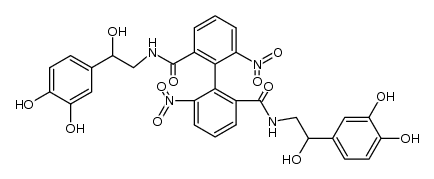
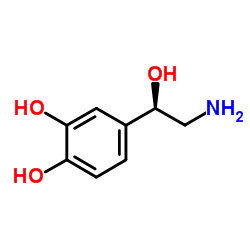
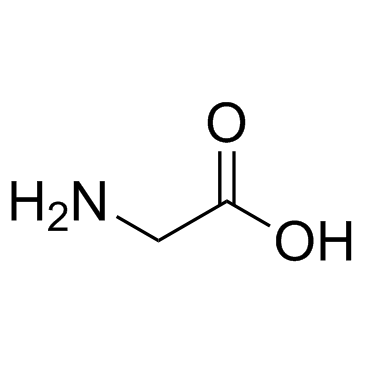
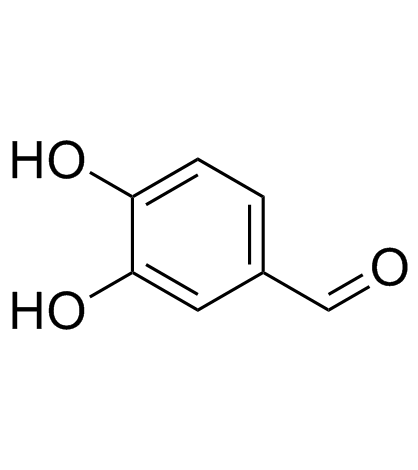
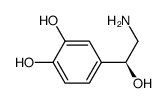
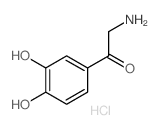
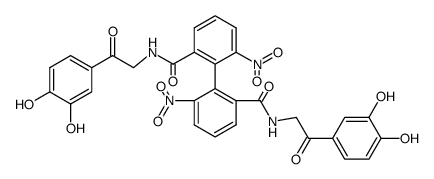
 CAS号490-89-1
CAS号490-89-1 CAS号41462-32-2
CAS号41462-32-2
